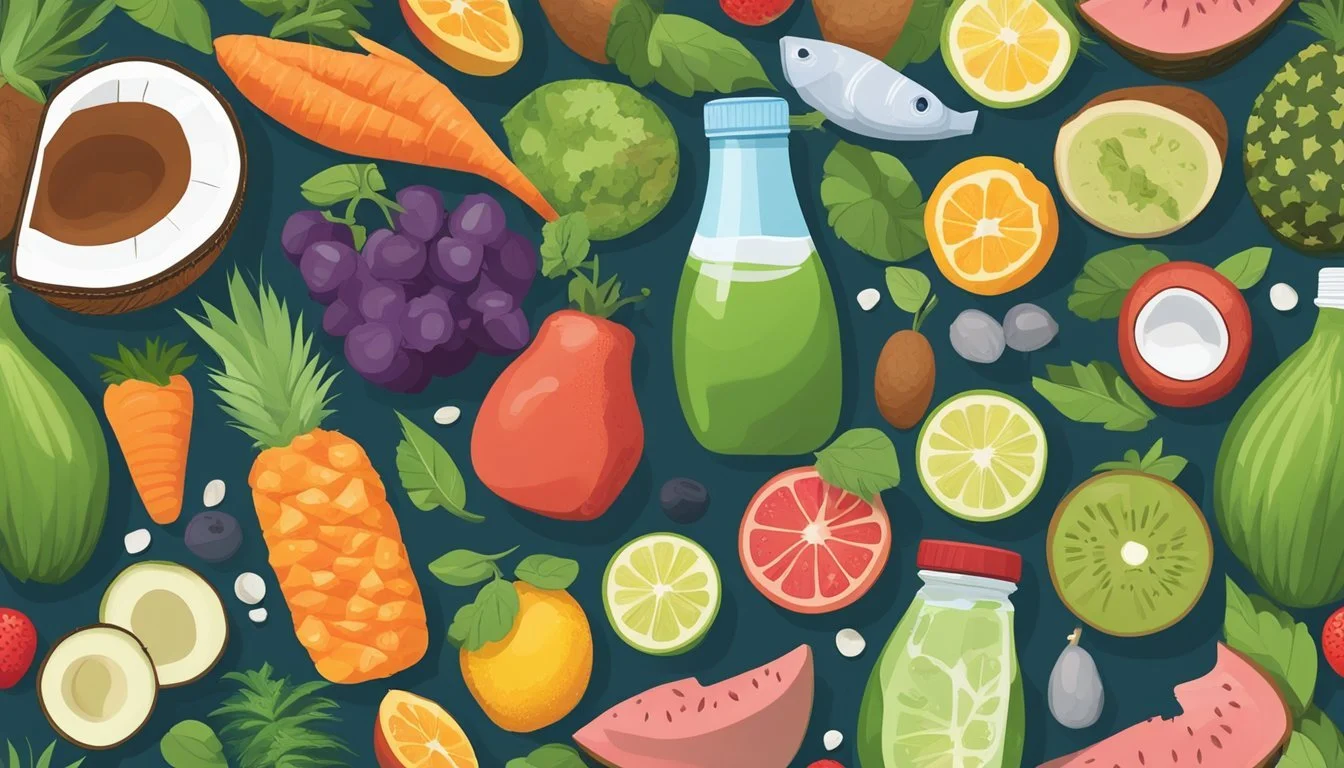Coconut Water on Carnivore Diet
Can It Fit into Your Regimen?
The carnivore diet is an eating pattern that consists predominantly of animal products. Proponents of this diet argue that it is reflective of ancestral eating habits and can lead to various health benefits. Characteristically, the diet excludes plant-based foods, focusing on meat, fish, eggs, and certain dairy products. The inclusion of beverages other than water, particularly those sourced from plants such as coconut water, is a subject of debate within the carnivore diet community.
Coconut water, valued for its electrolytes and natural sweetness, is often considered a healthy beverage in the context of a standard varied diet. However, within the confines of the carnivore diet, the status of coconut water is less clear. Pure water, both still and sparkling, bone broth, and milk are typically deemed acceptable as they align with the animal source criteria. Nevertheless, coconut water strays from the diet's principles due to its plant origins and sugar content, placing it in a gray area especially for purists of the carnivore diet.
Engagement with the carnivore diet often means scrutinizing the consumption of any beverage that is not derived from animal sources. This scrutiny is rooted in the aim to adhere to a low-carb, high-protein and fat regimen, which excludes not just coconut water but any plant-based food and drink. The decision to incorporate coconut water into an individual's carnivore diet can depend on personal goals and interpretations of dietary guidelines.
Understanding the Carnivore Diet
The Carnivore Diet revolves around consumption of primarily animal products and is often utilised for health benefits like weight loss and ketosis. Below is a focused examination of its core principles, typical foods included, and what potential benefits and risks it carries.
Core Principles of the Carnivore Diet
The essence of the Carnivore Diet is its emphasis on eating solely animal products. Meat, including beef, pork, chicken, and fish, acts as the cornerstone of this diet, providing both protein and fat. It excludes all plant-based foods, prioritizing a diet high in protein and fat with little to no carbohydrate intake. Proponents of this diet value it for its simplicity and its potential to induce a state of ketosis, where the body burns fat as its primary energy source.
Typical Foods on a Carnivore Diet
On this diet, one primarily consumes:
Meats: Beef, pork, lamb, chicken, turkey, and other meats
Seafood: Fish and shellfish
Animal Products: Eggs, lard, and bone broth
Dairy: Some plans allow for milk, cheese, and butter
Aside from these staples, mineral water is the beverage of choice to maintain hydration without adding carbohydrates. Bone broth is often recommended for its nutrient content and potential health benefits.
You can often find exclusive online offers for lard that you won’t see in stores!
Benefits and Risks Associated with Carnivore Diet
Health benefits claimed by those on the Carnivore Diet include weight loss, improved mental clarity, and reduced inflammation. It’s believed that the high intake of animal fats and proteins can satisfy hunger more efficiently and lead to a caloric deficit, thereby promoting weight loss. The diet’s high fat and protein content can also support a state of ketosis, which some suggest enhances fat burning and energy levels.
However, the diet carries potential risks, such as nutrient deficiencies (especially in vitamins and minerals typically found in plants), increased risk of heart disease due to high saturated fat intake, and potential for long-term health issues due to the lack of fiber and phytonutrients found in a more varied diet. It's important for individuals to consult healthcare providers before starting such a restrictive regimen.
Check out customer reviews online to help you choose the best fiber supplement!
Nutritional Components of Coconut Water
Coconut water is recognized for its high electrolyte content and relatively low caloric value, making it a hydrating beverage. Below is a detailed breakdown of its key nutritional components.
Minerals and Electrolytes in Coconut Water
Coconut water contains a variety of minerals and electrolytes essential for bodily functions. Notably, it is a good source of:
Potassium: Crucial for heart health and muscle function.
Magnesium: Important for muscle relaxation and nerve function.
Calcium: Vital for bone health.
Sodium: Essential for fluid balance and nerve transmission.
A table summarizing the mineral content in a typical serving of coconut water (1 cup, approximately 240 milliliters):
Potassium
Amount: 600 mg
Magnesium
Amount: 60 mg
Calcium
Amount: 40 mg
Sodium
Amount: 252 mg
These electrolytes also play a role in rehydration and maintaining fluid balance, especially after periods of intense physical activity.
Caloric and Carbohydrate Content
Coconut water is relatively low in calories yet contains natural sugars and carbohydrates. A standard serving size contains:
Calories: Ranges between 40 to 60 calories.
Carbohydrates: Approximately 9 to 12 grams.
Sugars: About 6 to 8 grams, depending on the maturity of the coconut.
While the carbohydrate content consists mostly of sugars such as glucose and fructose, it is essential to know that these are natural sugars, which differ from added sugars found in processed foods. Despite its sugar content, coconut water retains a good nutritional profile due to its mineral and electrolyte content.
The Role of Hydration
Hydration on a carnivore diet centers around maintaining adequate fluid intake, crucial for supporting metabolic processes and overall health.
Importance of Hydration on a Carnivore Diet
Hydration is critical on a carnivore diet because it aids in the digestion and absorption of nutrients primarily from high-protein animal products. Water plays a pivotal role in breaking down proteins and fats, and it is fundamental in preventing constipation and facilitating regular bowel movements. Individuals must ensure they consume a sufficient quantity of fluids daily, with an emphasis on water, to support kidney function and the excretion of metabolic byproducts such as urea.
Comparison with Other Drinks
When considering other drinks on a carnivore diet, choices are typically limited to those derived from animal sources. Here is a brief comparison:
Milk and Dairy:
Pros: Nutritional content aligns with the carnivore diet ethos.
Cons: Some individuals may be lactose intolerant or prefer to avoid the sugars found in milk.
Bone Broth:
Pros: Offers hydration and nutrients such as electrolytes.
Cons: Requires time to prepare but can be store-bought.
Tea and Coffee:
Pros: Can provide a sense of variety and comfort, without adding carbohydrates.
Cons: Overconsumption may lead to dehydration.
Mineral Water and Sparkling Water:
Pros: Can provide essential minerals, and sparkling versions can offer a palatable alternative to still water.
Cons: Certain types may contain additives or excess sodium.
Herbal Tea:
Pros: Caffeine-free option with potential health benefits.
Cons: Some herbal teas might contain plant compounds not aligned with strict carnivore principles.
Fruit juices, vegetable juices, and other plant-based beverages are typically excluded from a strict carnivore diet due to their carbohydrate content and non-animal origin. It is recommended that individuals prioritize water and other animal-derived beverages to remain true to the carnivore protocol while ensuring adequate hydration.
Inclusion of Coconut Water in a Carnivore Diet
Coconut water is a topic of discussion among individuals following a carnivore diet due to its plant origin and nutritional content. This section examines whether coconut water aligns with carnivore diet principles and how often it may be consumed if included.
Compatibility with Carnivore Diet Guidelines
The carnivore diet typically includes only animal products, focusing on meats, organs, eggs, and some dairy. Coconut water, sourced from fruits, naturally contains sugars and carbohydrates which are generally avoided on a strict carnivore diet. On a traditional carnivore diet, the inclusion of any plant-based item, such as fruit or coconut water, would be considered incompatible. However, some variations of the diet allow for minimal consumption of certain plant items like fruits and honey, making coconut water an optional addition for those not adhering strictly to the original guidelines.
Moderation and Frequency of Consumption
Given its plant-based nature, coconut water should be consumed in moderation if included in a carnivore diet. Due to its content of natural sugars and carbohydrates, frequent consumption may not align with the low-carb objectives of the diet. Those choosing to incorporate coconut water might do so sparingly, perhaps as an occasional hydrating drink, while predominantly consuming animal-based drinks such as water, bone broth, or milk. It is essential for individuals on a carnivore diet to monitor their reactions to coconut water intake and adjust accordingly to maintain the diet's integrity.
Potential Health Considerations
Assessing the inclusion of coconut water in a carnivore diet requires considering its impacts on blood sugar, its compatibility with ketosis, and how it might affect weight management goals.
Impact on Blood Sugar and Diabetes
Coconut water contains natural sugars that can raise blood glucose levels. While not excessively high in carbohydrates, the sugars present in coconut water might be a concern for individuals with diabetes. It's crucial to monitor blood sugar responses if coconut water is consumed, as it could potentially destabilize glycemic control.
Keto-Adaptation and Coconut Water
The carnivore diet often aligns with ketogenic principles, highlighting the importance of maintaining low carbohydrate intake to sustain a state of ketosis. Coconut water, being a source of carbohydrates, could interfere with keto-adaptation. Specifically, the glucose and other sugars in coconut water might interrupt the ketogenesis process, thus affecting the metabolic state desired in a ketogenic diet.
Coconut Water and Weight Management
In terms of weight management, incorporating coconut water into a carnivore diet could have conflicting effects. While it can contribute to hydration and provide electrolytes that may support physical activities, it also adds extra calories and sugars. People aiming for weight loss may need to be mindful of their total caloric intake and consider whether coconut water’s benefits align with their energy expenditure and diet objectives.
Alternatives to Coconut Water
For individuals following a carnivore diet who seek alternatives to coconut water for hydration and nutrition, there are several options that adhere to the diet's restrictions.
Bone Broth as a Hydration Source
Bone broth, made from simmering the bones of beef or other animals, is an excellent source of hydration on a carnivore diet. It contains electrolytes, minerals, and collagen, making it not only hydrating but also beneficial for joint and gut health. A serving suggestion would be:
Ingredients: Beef bones, water, salt (optionally, apple cider vinegar).
Preparation: Simmer bones in water for 12-24 hours.
Serving: Consume hot or store in refrigerator for use within a few days.
Other Acceptable Drinks on a Carnivore Diet
The carnivore diet primarily recommends water as the main beverage for those adhering to its guidelines. However, certain animal-derived liquids can also be acceptable. These may include:
Animal Sourced:
Milk: Preferably from cow, goat, or sheep, full-fat and unsweetened.
Eggs: Raw eggs blended into drinks for additional nutrients.
Non-Alcoholic:
Tea and Coffee: These are often considered acceptable, without added sugars or plant-based creamers.
It's important to note that alcohol is generally not recommended on the carnivore diet, as it can disrupt ketosis and is not derived from animal sources.
Avoid:
Sports Drinks and Energy Drinks: Contain sugars and artificial ingredients.
Herbal Teas: Plant-based and not in line with carnivore diet principles.
It's crucial for individuals to choose beverages that align with their health goals and dietary guidelines. Drink preferences can vary, but one should always consider the nutritional content and how it fits into their dietary plan.










